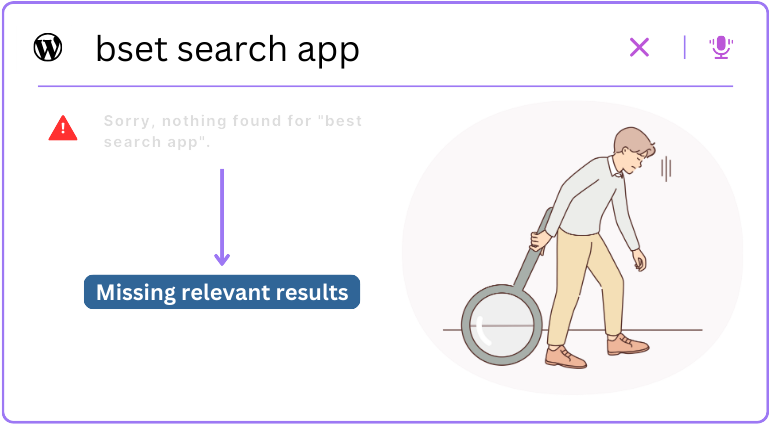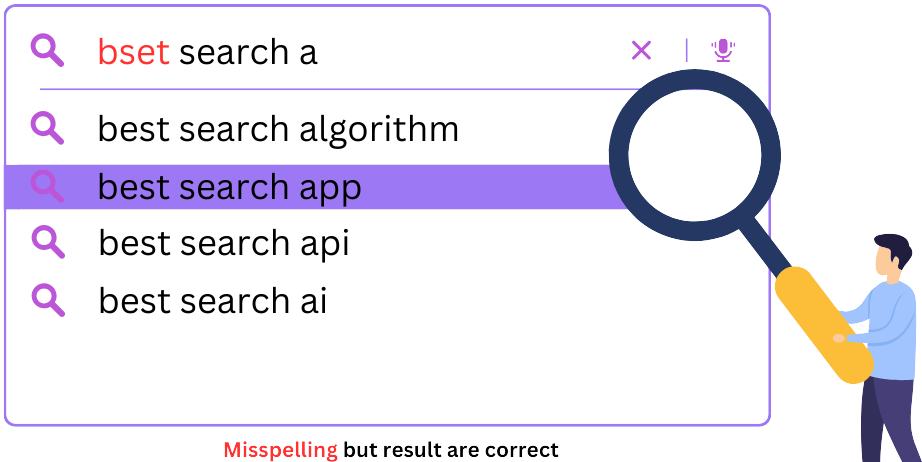
A well-functioning search feature is crucial for any website, yet many WordPress site owners find themselves frustrated with its limitations. A search function should help users find relevant content quickly, improving engagement and boosting conversions. However, WordPress’s default search is basic and lacks the features modern users expect.
Imagine walking into a massive bookstore looking for a specific novel, but instead of an organized system, you’re given a random stack of books and asked to dig through them. Frustrating, right? That’s exactly how visitors feel when they use the default WordPress search.
For business owners, website search is a critical tool. Whether you run an online store, a blog, or a service-based website, a good search function helps visitors find what they need quickly. But WordPress’s built-in search is disappointingly basic, often leaving users frustrated and causing them to leave your site.
The good news? You don’t have to stick with the default search. In this guide, we’ll explore why WordPress search is limited, the challenges users face, and, most importantly, how to fix it with practical solutions.
Table of Contents
- Why Default WordPress Search Fails: The Limitations & Frustrations
- How to Fix WordPress Search & Enhance UX
- Conclusion
Why Default WordPress Search Fails: The Limitations & Frustrations
The default WordPress search function lacks depth, precision, and efficiency. Instead of delivering relevant, refined results, it often provides generic and unstructured responses that frustrate users. Business owners who rely on their websites to drive sales or engagement need a search system that enhances user experience, not one that drives potential customers away. Below, we break down the key issues into three main categories.
A. Basic & Inefficient Search Mechanism
Without intelligent ranking, search results appear unstructured, making it difficult for users to find the most relevant information quickly. Instead of ranking results based on importance, the system simply displays them in order of publication date.

1. Lack of Relevance in Search Results
One of the biggest issues with WooCommerce’s default search is its lack of relevance. It works by searching for exact keyword matches in product titles and descriptions but does not understand intent or context. This is a problem because:
- Users searching for similar terms or related keywords may not find what they need.
- The system fails to recognize synonyms, leading to irrelevant or incomplete results.
- If a product or post doesn’t contain the exact search phrase, it won’t show up — even if it’s the most relevant result.
Example: If a customer searches for “best budget laptop,” WordPress may not show an article titled “Affordable Laptops for Professionals” because the words don’t match exactly. Instead, the search might return less relevant products or blog posts, leaving users frustrated and more likely to exit the site.
2. Inefficient Search Algorithms
WooCommerce search does not rank results based on importance, engagement, or relevance. Instead, it simply displays results in chronological order—meaning the most recently added content appears first, regardless of its usefulness to the user. This appears as a major issue because:
- Important products or posts may get buried under newer, but less relevant content.
- Popular and highly-rated products may appear lower in search results, leading to lost sales opportunities.
- Search results aren’t personalized, meaning every user sees the same results — even if their search behavior suggests different needs.
Example: A fashion store selling a best-selling “Black Leather Jacket” might have this item rank lower in search results just because it was added months ago. Meanwhile, a less popular product added last week appears at the top, reducing the chances of the user finding the best-selling item.
3. No Support for Partial Matches & Synonyms
Another major flaw in the default WooCommerce search is its inability to recognize partial matches, synonyms, or spelling variations. If a user searches for a term that is slightly different from how it is written in the store’s content, the search will fail to deliver relevant results. This is a problem because:
- Users must type exact words to find content, which is not user-friendly.
- The system doesn’t recognize similar words like “photo” vs. “photography” or “color” vs. “color”.
- Misspellings or typos lead to zero results, frustrating users who expect modern search engines to correct mistakes automatically.
Example: If a user searches for “photo,” but the store’s content includes “photography” or “photographer,” those results won’t appear because the system doesn’t recognize them as related terms. Similarly, if an American user types “color” while the website uses British spelling (“color”), the default search won’t connect the two, leading to missed opportunities and lost customers.
B. Lack of Filtering & Sorting Capabilities
When people search on a website, they expect to quickly find exactly what they need. A good search system should allow users to refine results by choosing categories, price ranges, tags, or product details. Unfortunately, the default WordPress search does not offer these features, making it harder to find specific products or content.

Without filters and sorting options, users have to scroll through many irrelevant results, leading to frustration and lost sales. Let’s look at the main reasons why this happens.
1. No Support for Custom Post Types, Taxonomies, or Meta Fields
Many websites use custom content types beyond regular posts and pages, such as:
- WooCommerce products (for online stores).
- Portfolio items (for creative businesses).
- Real estate listings (for property websites).
The problem is that WordPress search ignores these custom content types by default. If your website has products, testimonials, or listings stored in custom post types, they won’t appear in search results unless manually configured.
Example: A real estate website with a section for “Houses for Sale” may not show property listings in search results because WordPress only searches blog posts and pages by default. This is a problem, because:
- Users miss out on important content because search doesn’t include custom post types.
- Visitors may think the site is missing information, even when it’s available.
- Store owners lose potential sales if products don’t appear in search results.
2. No Advanced Filtering & Faceted Search
Most modern websites allow users to refine search results by selecting different options like:
- Category (e.g., Electronics, Clothing, Shoes).
- Price Range (e.g.,
 50,
50,  100).
100). - Brand or Color (e.g., Nike, Adidas, Red, Blue).
The default WordPress search does not support these filtering options, which makes it difficult for users to find the exact product they want. Instead, they have to manually scroll through long lists of results, which can be frustrating and time-consuming.
Example: An online clothing store should allow customers to filter by “Size,” “Color,” and “Price Range”. Without these options, a user looking for a red dress in size medium would have to scroll through hundreds of results manually — which may cause them to leave the site and shop elsewhere. This is a major issue because:
- Users struggle to narrow down their search, making shopping difficult.
- Customers waste time scrolling, increasing frustration.
- Without filters, large stores lose sales because people can’t find what they want.
3. No Real-Time or Predictive Search Suggestions
When you search on Google or Amazon, you’ll notice that as you start typing, it suggests related search terms. This feature, called predictive search, helps users find what they need faster. However, WordPress search lacks this feature, meaning users have to guess the right keywords on their own.
Example: If someone types “Nike” into a store’s search bar in wordpress, it should automatically suggest:
- Nike Running Shoes
- Nike Basketball Sneakers
- Nike Sportswear Jackets
Since WordPress doesn’t offer this feature, users may struggle to find the right product names, leading to missed sales opportunities. This is a problem because:
- Users have to type the exact product name, which is frustrating.
- Customers may leave the website if they don’t see relevant suggestions.
- Businesses lose potential buyers who might have made a purchase if guided correctly.
C. Performance & Customization Challenges
Even if WordPress search had better relevance and filtering, it would still face major performance issues and lack customization options. Many website owners struggle to provide a fast and personalized search experience because the default system is not designed for large websites or tailored search results.
For eCommerce stores, news websites, or content-heavy platforms, a slow and rigid search system can make it harder for users to find what they need, leading to frustration and lost engagement. Below are the main challenges that affect search performance and customization.
1. Performance Issues on Large Websites
The bigger the website, the slower the search. WordPress does not use optimized indexing, which means it scans all content every time someone searches. For websites with thousands of pages, blog posts, or products, this process can take too long, making the search experience frustrating.
Example: A news website with thousands of articles might have slow search response times, making it difficult for readers to quickly find past articles or trending topics.
Here are the facts why this is a problem:
- Large sites take longer to display search results.
- The database is not optimized for fast lookups, making search sluggish.
- Users may leave the site if they have to wait too long for search results.
Solution: Using search & filter plugin wordpress with better indexing (like SearchWP or ElasticPress) can help speed up search performance.
2. No AI or Machine Learning for Smart Search
Many modern websites use AI-powered search engines to personalize results based on user behavior. However, WordPress does not have built-in AI or machine learning, which means it cannot adapt to user preferences or show smart recommendations.
Example: In an online electronics store, if a customer searches for “smartphone,” an AI-powered search would prioritize trending or best-selling smartphones at the top. But in default WordPress search, results appear randomly, without understanding what users are most interested in.
This is a problem because:
- Users don’t get personalized results, leading to less relevant searches.
- Search results do not improve over time because WordPress doesn’t learn from user behavior.
- Trending, popular, or high-rated products don’t automatically show up first.
Solution: Advanced search engines like Algolia or Elasticsearch use AI and ranking algorithms to improve search results over time.
3. Limited Search Customization Options
Website owners cannot control how search results are ranked in WordPress. This means they can’t boost important products, highlight seasonal promotions, or adjust rankings manually.
Example: If an eCommerce store wants to promote “Summer Sale” items at the top of search results, there is no built-in way to do this. WordPress does not allow store owners to manually adjust search rankings.
This is a problem because:
- Store owners can’t promote featured products in search results.
- Important content gets buried under newer, but less relevant results.
- Businesses lose potential sales because they can’t highlight high-priority items.
Solution: Using search plugins with ranking controls, such as SearchWP or Relevanssi, allows store owners to prioritize certain products or pages in search results.
How to Fix WordPress Search & Enhance UX
If your website visitors struggle to find what they’re looking for, it’s time to improve your WordPress search function. A better search experience keeps users engaged, improves conversions, and makes your site more user-friendly. Here’s how you can enhance WordPress search with practical solutions.
A. Implementing Smarter & More Relevant Search
A great search experience helps users find what they need quickly and easily. The default WordPress search is basic and often inaccurate, but you can make it smarter and more user-friendly with a few simple improvements.

By using advanced search plugins, typo correction, and predictive search, websites can provide faster, more relevant results, improving both user experience and sales. Let’s explore three ways to make WordPress search more effective.
1. Use an Advanced Search & Filter Plugin
One of the easiest ways to improve search accuracy is by using a dedicated search plugin. The default WordPress search only looks at post titles and content, but advanced search plugins scan deeper and rank results more intelligently.
Here are the best search plugins:
- SearchWP – Searches inside product descriptions, custom fields, and even PDFs.
- Relevanssi – Allows custom ranking, meaning you can prioritize important content.
- ElasticPress – Designed for large websites, making search much faster and scalable.
Example: If you own a WooCommerce store, these plugins let customers search by SKU, category, tags, or product descriptions—not just by product title. This makes finding items easier and improves sales.
Why This is Important:
- Users find the right content or products faster.
- Stores can offer advanced filtering, helping customers narrow down searches easily.
- It reduces frustration, making users more likely to stay and shop.
2. Enable Fuzzy Search & Synonym Handling
Not every user types the perfect keyword when searching. Some may misspell words, use different terms, or only type part of a word. A smart search function should recognize typos, understand synonyms, and show results that closely match what the user meant.
Example: If a visitor searches for “jogging shoes,” they should still see results for “running shoes”. Without synonym handling, the search might return zero results, frustrating the user.
How to Enable This:
- Use Relevanssi to add synonyms and typo corrections.
- Enable fuzzy search so users still get results even with small spelling mistakes.
- Set up alternative keywords so similar terms return useful results.
Why This Matters:
- Users don’t have to type exact words to get good results.
- Small typos won’t lead to empty searches.
- The search engine feels smarter and more helpful.
3. Add Instant Search & Autocomplete
Have you noticed how Google suggests search results as you type? This feature, called predictive search, helps users find what they need faster by showing related search terms instantly.
Example: If a user starts typing “iPhone,” the search should instantly suggest:
- iPhone 13
- iPhone charger
- iPhone accessories
How to Enable This:
- Use Ajax Search Lite to show real-time search suggestions.
- Enable autocomplete so users can see results before finishing their query.
- Highlight common searches based on what other users are searching for.
Why This is Important:
- Saves users time by predicting their search.
- Increases engagement, keeping users on your site longer.
- Makes the shopping experience smoother, especially on large websites.
B. Enhancing Filtering & Organization of Search Results
A good search system doesn’t just find results—it helps users organize and filter them easily. When users search for something, they often want to narrow down their results based on specific details like category, price, brand, or tags. Without proper filtering and organization, search results can feel messy and overwhelming.

By improving filters, customizing the search page layout, and using indexing, websites can make search results more user-friendly, faster, and visually appealing. Here’s how to do it.
1. Implement Faceted Search for Better Filtering
Faceted search allows users to refine search results using different filters, such as:
- Category (e.g., Electronics, Clothing, Home Appliances).
- Price Range (e.g., Under
 50-
50- 100+).
100+). - Tags & Attributes (e.g., Brand, Size, Color, Location).
Without faceted search, users have to scroll through hundreds of results manually, making the shopping or browsing experience frustrating.
Example: A job board website can allow users to filter job listings by location, salary range, and job type using plugins like FacetWP and JetSmartFilters. This way, a job seeker can quickly find jobs in their city and within their salary expectations instead of sifting through irrelevant listings.
Why This is Important:
- Saves time by helping users find what they need faster.
- Improves user experience, making navigation easier.
- Increases conversions, as customers are more likely to find and buy what they’re looking for.
Solution: Use WooCommerce filtering plugins like FacetWP, JetSmartFilters, or SearchWP to add better filtering options.
2. Customize Search Page Layout & UX
A messy and plain search results page can make users lose interest quickly. Instead of just showing a simple list of text links, search results should be visually organized, making it easy to scan and select the right product or content.
How to Improve Search Layout:
- Display product images alongside search results.
- Show key details like price, stock availability, and customer ratings.
- Allow sorting options (e.g., “Most Relevant,” “Highest Rated,” or “Newest First”).
Example: An eCommerce store can increase sales and customer engagement by displaying product prices, stock availability, and customer reviews directly in search results. This way, shoppers can compare items at a glance without clicking on each product page.
Why This is Important:
- Makes search results more user-friendly and visually appealing.
- Reduces extra clicks, helping users make faster decisions.
- Encourages more sales, as customers can quickly compare options.
Solution: Use WooCommerce-compatible themes or search layout customization plugins to make search results look better and more functional.
3. Implement Search Indexing for Speed & Accuracy
One of the biggest reasons why search is slow is because WordPress scans every page and product manually every time a user searches. This process is inefficient and time-consuming, especially for large websites with thousands of pages.
Search indexing fixes this problem by organizing content in advance, so results appear instantly instead of scanning the whole database repeatedly.
Example: A news website with thousands of articles can use Elasticsearch or Algolia to pre-organize and index articles, delivering instant search results instead of waiting several seconds for a response.
Why This is Important:
- Makes search much faster, even for large stores or content-heavy sites.
- Increases accuracy, showing more relevant results.
- Reduces server load, preventing slowdowns during high traffic.
Solution: Use search indexing tools like Elasticsearch, Algolia, or Meilisearch to improve search speed and accuracy.
C. Improving Speed & Performance of WordPress Search
A fast search system is important for keeping visitors engaged and helping them find what they need quickly. If search results take too long to load, users may leave the website and look elsewhere.

The default WordPress search is not optimized for speed, but by cleaning up the database, enabling caching, and using AI-powered search, you can greatly improve search performance. Let’s look at how to make WordPress search faster and more efficient.
1. Optimize Database for Faster Search
A cluttered database slows down search queries. Over time, WordPress stores unnecessary data, such as:
- Old post revisions
- Spam comments
- Temporary files (transients)
By regularly cleaning up the database, you can reduce the time it takes to search for content.
Example: An online magazine with thousands of articles can use tools like WP Rocket or WP-Optimize to delete unnecessary data, making searches load much faster.
Why This is Important:
- Speeds up search results by removing junk data.
- Reduces database size, making queries faster.
- Improves overall website performance.
Solution: Use plugins like WP-Optimize to automate database cleanup and keep search running smoothly.
2. Implement Search Caching for Performance
Every time someone searches, WordPress retrieves fresh results from the database, which takes time. Caching helps by saving previous search results, so if someone searches for the same thing again, the results load instantly.
Example: If multiple visitors search for “best smartphones”, caching saves the results and loads them instantly, rather than querying the database every time.
Why This is Important:
- Reduces server load, making search much faster.
- Helps high-traffic websites handle many searches at once.
- Improves user experience since results appear instantly.
Solution: Use caching plugins like LiteSpeed Cache or WP Rocket to store search queries and speed up repeated searches.
3. Use AI-Powered Search for Personalized Results
AI-powered search helps websites understand what users are looking for and show the most relevant results first. Instead of just matching keywords, AI can learn from user behavior to make search results more useful and personalized.
Example: An online store can use AI to recommend products based on previous searches. If a user often searches for gaming laptops, AI can prioritize gaming-related results, making shopping faster and more relevant.
Why This is Important:
- Makes search results smarter and more personalized.
- Helps users find what they need faster, improving satisfaction.
- Increases sales and engagement since users see products they are interested in.
Solution: Use AI-powered search tools like Algolia, Meilisearch, or ElasticPress to improve search relevance and ranking.
D. Tracking & Optimizing Search Based on User Behavior

A good search system doesn’t just provide fast and relevant results — it should also help website owners understand what users are looking for. By tracking searches and analyzing user behavior, you can improve search accuracy, create better content, and optimize search performance over time.
Making small but regular improvements to search functionality helps keep users happy and ensures they always find what they need. Here’s how to do it.
1. Incorporate Search Analytics
Tracking what users search for can give you valuable insights into what they want. If a search returns poor results or shows no matches, it’s a sign that you may need to add new content or improve search settings.
Example: If many users search for a topic that doesn’t exist on your site, that means they’re interested in it. This is a great opportunity to create new content, products, or pages to meet their needs.
Why This is Important:
- Helps improve search results by identifying missing content.
- Shows what users are interested in, helping businesses adapt to demand.
- Reduces frustration, as users find what they need more often.
Solution: Use search analytics tools like Google Analytics, WP Search Insights, or SearchWP Metrics to track popular searches and improve content accordingly.
2. Regularly Test and Optimize Search Performance
Improving search is not a one-time task—it requires regular testing and adjustments to keep it working smoothly. Search behavior changes over time, and periodic testing helps ensure that users always get fast and relevant results.
Example: Using Google Analytics or heatmap tools, website owners can see how users interact with search, identify problem areas, and make necessary improvements.
Why This is Important:
- Ensures search stays fast, relevant, and user-friendly.
- Helps fix issues before they frustrate visitors.
- Improves overall website performance by adjusting to user needs.
Solution: Regularly test search speed, relevance, and filters using analytics tools, A/B testing, and real user feedback.
Take Your Website’s Search to the Next Level
At Flowrec Solutions, we know that a great search experience can be a game-changer for your business. If visitors can’t find what they’re looking for quickly, they will leave—costing you potential sales and engagement. Our team specializes in optimizing WordPress search functions, ensuring users get fast, accurate, and relevant results every time. Whether you need advanced filters, AI-driven personalization, or a complete search overhaul, we’ve got you covered.
Don’t let poor search functionality hurt your website’s performance. Contact Flowrec Solutions today and let’s create a seamless search experience that keeps users engaged and drives results!
Conclusion: Transforming WordPress Search for a Better UX
The default WordPress search is far from perfect, but it doesn’t have to stay that way. By adding advanced search plugins, filtering options, and performance optimizations, you can create a seamless search experience that keeps visitors engaged and increases conversions.
If you’re serious about improving user experience and maximizing sales, investing in a better search system is one of the smartest moves you can make. After all, the easier it is for visitors to find what they need, the more likely they are to stay, explore, and buy!
For more expert insights on search optimization and increase sales, explore our latest blogs:

